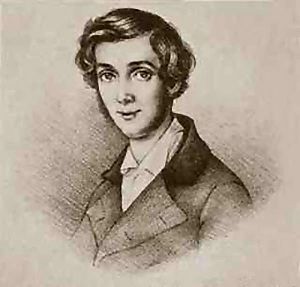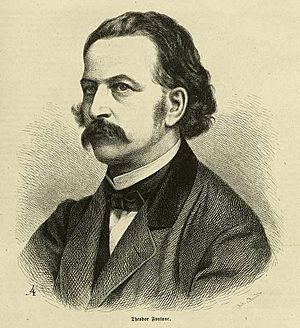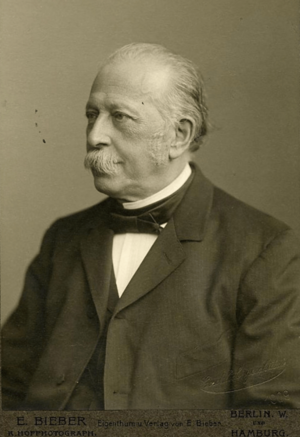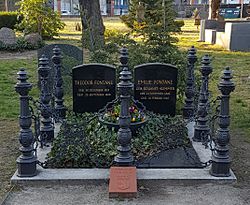Theodor Fontane facts for kids
Quick facts for kids
Theodor Fontane
|
|
|---|---|
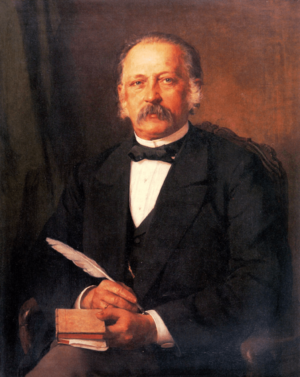
Fontane (1883), painting by Carl Breitbach
|
|
| Born | 30 December 1819 Neuruppin, Brandenburg, Prussia |
| Died | 20 September 1898 (aged 78) Berlin, German Empire |
| Occupation | Writer |
| Nationality | German |
| Period | 19th century |
| Genre | Novel |
| Notable works | Effi Briest, On Tangled Paths, The Stechlin, Frau Jenny Treibel |
| Spouse | Emilie Rouanet-Kummer (1824–1902; m. 1850, until his death) |
| Children | 7 (four of them lived into adulthood) |
Theodor Fontane (born December 30, 1819 – died September 20, 1898) was a famous German novelist and poet. Many people think he was the most important German writer of realist stories in the 1800s. He started publishing his well-known novels when he was 58 years old, after working as a journalist for many years.
Fontane's novels often show a thoughtful, sometimes questioning, view of society in the German Empire. He liked to show different parts of society meeting and sometimes disagreeing. His stories are also known for their strong female characters, like Effi Briest and Frau Jenny Treibel. He used gentle humor and lively conversations between his characters.
Contents
Life of Theodor Fontane
Early Life and Education
Theodor Fontane was born in Neuruppin, a town about 30 miles northwest of Berlin. His family were Huguenots, who were French Protestants who had moved to Germany. When he was sixteen, he started training to be an apothecary, which was his father's job. An apothecary prepares and sells medicines.
In 1839, at age 20, Fontane became an apothecary himself. He also wrote his first work, a story that is now lost. He continued his education in Leipzig, where he met many progressive thinkers of the time.
First Writings and Literary Connections
Fontane's first published story, Geschwisterliebe (which means "Sibling Love"), appeared in a Berlin newspaper in December 1839. His first job as an apothecary was in Dresden. Later, he worked in his father's shop in Letschin.
He didn't like the quiet life in the countryside. So, he started writing articles for a Leipzig newspaper and translating plays by William Shakespeare. In 1843, he joined a literary club in Berlin called "Tunnel über der Spree." There, he met many famous German writers, including Theodor Storm and Gottfried Keller.
Career as a Journalist
In 1844, Fontane joined the Prussian army. He also began traveling to England many times. These trips made him very interested in old English poems and songs, which he tried to copy in his own writing. He loved England his whole life. In 1845, he got engaged to Emilie Rouanet-Kummer, whom he later married.
Fontane was briefly involved in the revolutions of 1848, which were a series of protests across Europe. In 1849, he stopped being an apothecary and became a full-time journalist and writer. To support his family, he took a job with a Prussian government office. This office aimed to influence newspapers to support German nationalist ideas.
He focused on British news for this job. For several years, he worked as a correspondent in London. His wife, Emilie, and their first two sons later joined him there. While in London, he left his government job. When he returned to Berlin, he became an editor for a conservative newspaper. Fontane believed in a free press and a united Germany. He sometimes felt conflicted about working for a newspaper that didn't always share his views.
Travels and Observations
Fontane wrote several travel books about Britain. These include Ein Sommer in London (A Summer in London, 1854) and Jenseit des Tweed, Bilder und Briefe aus Schottland (Beyond the Tweed, Pictures and Letters from Scotland, 1860). In these books, he wrote about the nature and mood of Britain at that time.
When he was back in Germany, Fontane became very interested in his home region, the March of Brandenburg. He enjoyed walking through its countryside and small towns. He also liked seeing how Berlin, the capital city, grew. His love for the area around Berlin can be seen in his book Wanderungen durch die Mark Brandenburg (Walks through the Province of Brandenburg, 1862–82). In this book, he wrote about the history and beauty of his homeland.
Reporting on Wars
In 1870, Fontane left his newspaper job and became a drama critic for a liberal newspaper. He kept this job until he retired. He had already written about Prussia's war against Denmark in 1864 and the Austro-Prussian War in 1866.
He went to the front lines to observe the Franco-Prussian War in 1870. He was captured in France and remained a prisoner for three months. He wrote about his experiences in Kriegsgefangen Erlebtes 1870 (Experiences as a Prisoner of War, 1871). He also published his thoughts on the war in a book called Der Krieg gegen Frankreich 1870–71 (The War against France, 1870–71). In his writings, he often criticized the idea of war just for glory, saying it was "nauseating" without a good reason.
Later Years and Novels
When he was 57, Fontane finally started writing the novels that he is most famous for today. This was a dream come true for him, as he had always wanted to make a living from his writing.
His novels like Irrungen, Wirrungen (Trials and Tribulations, 1888), Frau Jenny Treibel (1892), and Effi Briest (1894–95) gave readers a look into the lives of both the nobility (upper class) and middle-class people. His way of writing was later called "poetic realism," meaning he showed real life in a beautiful and thoughtful way. In Der Stechlin (written 1895–97), his last finished novel, Fontane used his realistic style and social criticism to describe life in Prussia.
Death
Fontane had health problems in his last years. However, he continued to work until just a few hours before he passed away. He died in the evening of September 20, 1898, in Berlin. He was buried in the cemetery of the French Protestant Church in Berlin. His wife, Emilie, was buried next to him four years later. Their graves were damaged during World War II but were later fixed.
Theodor Fontane's Prose Works
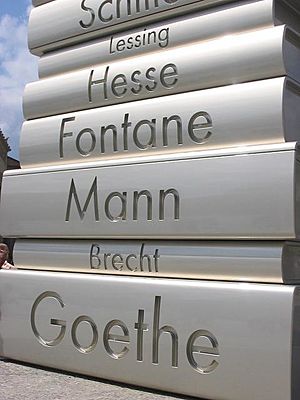
- Geschwisterliebe, 1839
- Zwei Post-Stationen, 1845
- James Monmouth, 1854
- Tuch und Locke, 1854
- Goldene Hochzeit, 1854
- Ein Sommer in London, 1854
- Aus England. Studien und Briefe über Londoner Theater, Kunst und Presse, 1860
- Jenseit des Tweed. Bilder und Briefe aus Schottland, 1861
- Wanderungen durch die Mark Brandenburg, 1862–89
- Der Schleswig-Holtsteinsche Krieg im Jahre 1864, 1866
- Kriegsgefangen. Erlebnis, 1870
- Der deutsche Krieg von 1866, 1870–71
- Vor dem Sturm, 1878 (translated as Before the Storm)
- Grete Minde, 1880
- Ellernklipp, 1881
- Schach von Wuthenow, 1882 (translated as A Man of Honor)
- Graf Petöfy, 1884
- Unterm Birnbaum, 1885 (translated as Under the Pear Tree)
- Cécile (novel), 1887
- Irrungen, Wirrungen. Berliner Roman 1888 (translated as On Tangled Paths)
- Fünf Schlösser. Altes und Neues aus Mark Brandenburg, 1889
- Stine, 1890
- Quitt, 1891
- Unwiederbringlich, 1891 (translated as Irretrievable)
- Frau Jenny Treibel, 1892 (translated as Jenny Treibel)
- Meine Kinderjahre, 1894
- Effi Briest, 1894–95
- Die Poggenpuhls, 1896 (translated as The Poggenpuhl Family)
- Der Stechlin, 1898 (translated as The Stechlin)
- Mathilde Möhring, 1906.
Theodor Fontane's Poems
- Balladen, 1861
- Archibald Douglas
- Die Brück' am Tay
- John Maynard
- Herr von Ribbeck auf Ribbeck im Havelland (translated as Nick Ribbeck at Ribbeck in Havelland)
- Aber es bleibt auf dem alten Fleck
- Ausgang
- Gorm Grymme
- Das Trauerspiel von Afghanistan
- Wo Bismarck Liegen Soll
- Kaiser Friedrich III.
- Jung-Bismarck
- Jakobitenlieder
- Märkische Reime
See also
 In Spanish: Theodor Fontane para niños
In Spanish: Theodor Fontane para niños
- Statue of Theodor Fontane, Tiergarten, Berlin
 | Dorothy Vaughan |
 | Charles Henry Turner |
 | Hildrus Poindexter |
 | Henry Cecil McBay |


